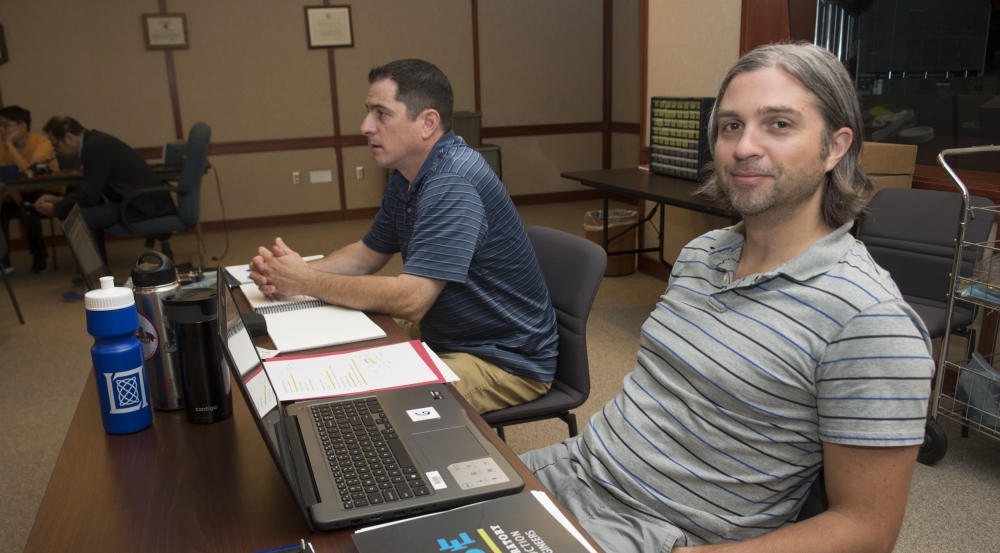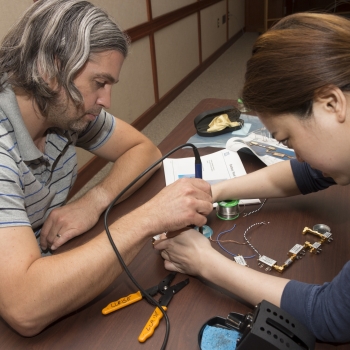High school teachers become students for a week to learn about radar systems
From 9 to 22 July, the Lincoln Laboratory Radar Introduction for Student Engineers (LLRISE) summer program provided 18 high school students from across the country with a project-based course on radar fundamentals. For the first time since LLRISE's inception, two high school physics teachers participated in the first week of the program. The teachers, both of whom were from Michigan, took part in all aspects of the curriculum along with the students; they attended lectures on the basics of radar systems, assembled radar systems that could perform range-Doppler imaging, learned about computer-aided design and 3D printing, and went on tours of Lincoln Laboratory's facilities.
The teachers were interested in evaluating how the radar workshops could be incorporated into their own physics classes. They were particularly excited about integrating the radar lessons into labs and projects and supplementing conceptual lectures with hands-on building activities.

"We already have the theory, but it'll be great for students to know how the radar is applied and how to build it. And it's great to not just be able to talk about the Doppler effect, but to also have examples of how it affects the real world and how it all ties together," said Scott Brunner, who has been teaching physics for 10 years and currently teaches eleventh- and twelfth-grade physics at University Liggett School in Grosse Pointe Woods, Michigan. He plans to implement lessons about the construction and use of radar into the electricity and magnetism class at his school. With so much material to cover in the school year, he said, the radar lessons will likely be part of the after-school curriculum.
The teachers said one of the things that made their learning experience at LLRISE so productive was the Lincoln Laboratory staff instructors. "I've been impressed by the instructors – how real they are, how approachable they are. These are some of the smartest people in their fields, but they don't dumb anything down for the students," said Gary Campbell, a physics teacher of 20 years at Rochester High School in Rochester, Michigan.
The students certainly were able to keep up with the material and asked advanced questions, said Brunner. As they spent the week together, the teachers and students developed a friendly relationship based on mutual learning. They ate lunch together every day and the teachers helped students through difficult problems. In return, the teachers said they often gained insight into alternative ways of learning from the students.
"It was great having teachers in the classroom," said Chiamaka Agbasi-Porter, one of the developers of LLRISE. "This year, there was a different dynamic in the classroom when teachers were present, as compared to previous years without teachers. The teachers were able to help explain some concepts to students who found the material a little challenging. It was great to see the teachers enthusiastically building their radar and thinking about how to incorporate the LLRISE curriculum into their schools."
While Campbell and Brunner were eager to bring back new material to their classrooms, they expressed regret about having to part with the students and the LLRISE program so soon. "I'm actually disappointed to be leaving," said Brunner at the end of the week, saying he wished he could have seen how the students' radar projects turned out. But both teachers said they enjoyed being the first teachers to collaborate with LLRISE and are looking forward to providing feedback about their experience to help the program next year.
For the future, the LLRISE organizers are developing online classes consisting of lectures and instructions for building small radar systems. Both students and teachers can access these lessons from home. In addition, local teachers will have the opportunity to meet with Lincoln Laboratory staff mentors throughout the school year. The mentors will provide the teachers with guidance for introducing the radar curriculum into their classrooms.
"We want LLRISE for Teachers to be meaningful and effective for all teachers, and we want to provide a framework for long-term integration of new technology," said Agbasi-Porter. "With Lincoln Laboratory mentors present, we can empower teachers to teach a really focused topic such as radar."
